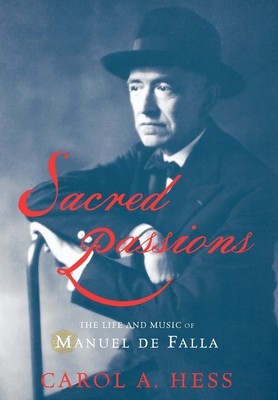
- We will send in 10–14 business days.
- Author: Carol A Hess
- Publisher: Oxford University Press, USA
- ISBN-10: 0195145615
- ISBN-13: 9780195145618
- Format: 16.3 x 23.9 x 2.7 cm, hardcover
- Language: English
- SAVE -10% with code: EXTRA
Reviews
Description
The work of composer Manuel de Falla (1876-1946) ranges from late-romantic salon pieces to evocations of flamenco to stark neoclassicism. Yet his music has met with conflicting reactions, depending on the audience. In his native Spain, Falla is considered the most innovative composer of the first half of the twentieth century. Likewise, in the United States, Falla enjoyed a strong following in the concert hall. But many of his works, especially some of the "colorful" or "exotic" dances from The Three-Cornered Hat and El Amor Brujo, were taken up during the Latin music craze of the 1930s and 40s and appeared in everything from jazz and pop arrangements to MGM musicals. Similarly enigmatic are the details of Falla's life. He never sustained a lasting, intimate relationship with a woman, yet he created compelling female roles for the lyric stage. Although he became incensed when publishers altered his music, he more than once tinkered with Chopin and Debussy. Despite insisting that
he was apolitical, Falla ultimately took sides in the Spanish Civil War, initially allying himself rather half-heartedly with Franco's Nationalists but later rejecting the honors they proffered. All his life, his rigorous brand of Roman Catholicism brought him both solace and agony in his quest for spiritual and artistic perfection.
EXTRA 10 % discount with code: EXTRA
The promotion ends in 20d.02:58:26
The discount code is valid when purchasing from 10 €. Discounts do not stack.
- Author: Carol A Hess
- Publisher: Oxford University Press, USA
- ISBN-10: 0195145615
- ISBN-13: 9780195145618
- Format: 16.3 x 23.9 x 2.7 cm, hardcover
- Language: English English
The work of composer Manuel de Falla (1876-1946) ranges from late-romantic salon pieces to evocations of flamenco to stark neoclassicism. Yet his music has met with conflicting reactions, depending on the audience. In his native Spain, Falla is considered the most innovative composer of the first half of the twentieth century. Likewise, in the United States, Falla enjoyed a strong following in the concert hall. But many of his works, especially some of the "colorful" or "exotic" dances from The Three-Cornered Hat and El Amor Brujo, were taken up during the Latin music craze of the 1930s and 40s and appeared in everything from jazz and pop arrangements to MGM musicals. Similarly enigmatic are the details of Falla's life. He never sustained a lasting, intimate relationship with a woman, yet he created compelling female roles for the lyric stage. Although he became incensed when publishers altered his music, he more than once tinkered with Chopin and Debussy. Despite insisting that
he was apolitical, Falla ultimately took sides in the Spanish Civil War, initially allying himself rather half-heartedly with Franco's Nationalists but later rejecting the honors they proffered. All his life, his rigorous brand of Roman Catholicism brought him both solace and agony in his quest for spiritual and artistic perfection.


Reviews